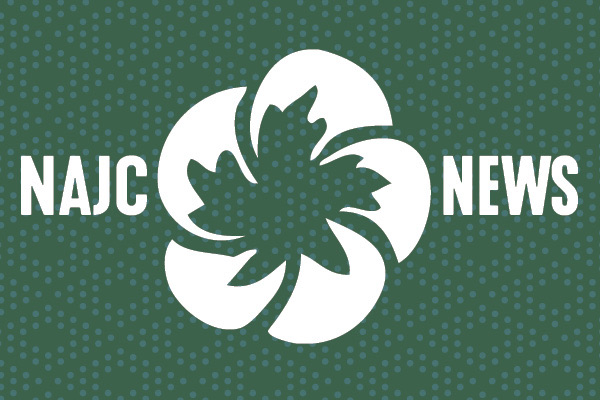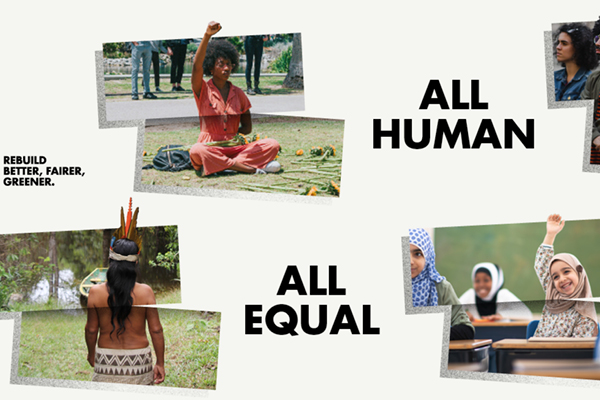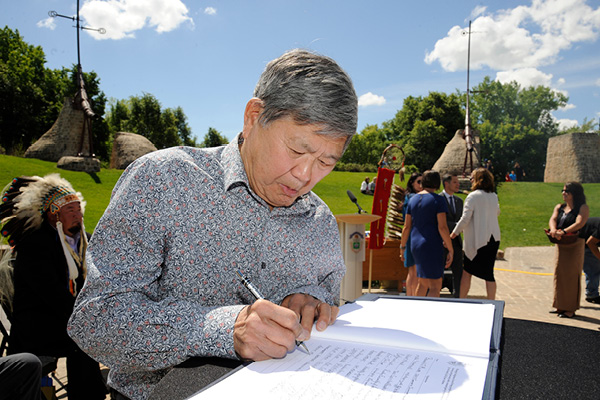 At the 2012 NAJC AGM held in Kamloops BC, Vancouver human rights advocate Tatsuo Kage was awarded the 2012 Dr. Gordon Hirabayashi Human Rights Award. Awarded this year for the first time, the award honours the work and legacy of Dr. Gordon Hirabayashi of Edmonton. The award will be presented every two years in recognition of an individual or organization who has contributed to the development or promotion of human rights and equity in Canada.
At the 2012 NAJC AGM held in Kamloops BC, Vancouver human rights advocate Tatsuo Kage was awarded the 2012 Dr. Gordon Hirabayashi Human Rights Award. Awarded this year for the first time, the award honours the work and legacy of Dr. Gordon Hirabayashi of Edmonton. The award will be presented every two years in recognition of an individual or organization who has contributed to the development or promotion of human rights and equity in Canada.
Although unable to accept the award in person, Mr. Kage sent am acceptance video. The following is an edited version of the speech.
Message from Tatsuo Kage, Recipient of Dr. Gordon Hirabayashi Human Rights Award to the NAJC AGM in Kamloops on September 14, 2012
Re. Dr. Gordon Hirabayashi Human Rights Award
Dear Ken Noma, Lillian Maguire, Roy Inouye and everybody:
I am greatly honored to be the first recipient of the Dr. Gordon Hirabayashi Human Rights Award. Since I am unable to attend the AGM, I would like to read my message through a video.
Most of my involvements in Human Rights activities have been team efforts with my colleagues in both the Vancouver and national Human Rights Committees and I have also been inspired through my work in collaboration with individual and community human rights groups outside our community.
Around 1985 I met Dr. Gordon Hirabayashi for the first time at an NAJC meeting and I was impressed with his warm and friendly manner.
As a postwar immigrant I was very much interested in the Redress movement because of my interest in democracy in general and how the Japanese Canadian community could handle the historical challenge of dealing with the Redress issue. My role in the local activities was to facilitate communication among the different generations as an interpreter and translator, working closely with leaders such as Roy Miki.
Through the redress movement and its settlement of 1988 we saw that enthusiasm and energy were generated in the community, and we wanted to canalize that energy towards general causes of Human Rights, equality and justice. In the early 1990’s when the local Redress Committee decided to dissolve, a few of us including Judy Hanazawa and myself decided to form a Human Rights Committee within the Greater Vancouver JCCA.
One of our concerns around that time was the harassment and discrimination experienced by newcomers who were working in small businesses such as restaurants. In addition to individual assistance we decided to produce a Bilingual Human Rights Guide that was published in 1995 and revised and expanded in 2003.
My own human rights education was also expanding and I became one of the Canadian NGO delegates to attend the United Nations World Conference of Human Rights in Vienna in 1993. It was there that I heard the testimonies of “comfort women” for the first time, and became exposed to the International dimension of human rights.
In 1997 I attended a meeting with an exhibit and discussion on the 60th anniversary of the Nanjing Massacre of 1937, which was organized by Chinese Canadian groups. This event marked the beginning of our on-going working relations with the Chinese Canadians such as the BC ALPHA.
Also at that time the history textbook issue in Japan reached its final stage. The issues included the inclusion of the Nanjing Massacre and the biological warfare (Unit 731) in school text books, because the Japanese Ministry of Education had censored the inclusion of these events in the textbooks. Together with Chinese, Korean and Jewish Canadians, we started a signature campaign to support this textbook court case for the final verdict of the highest court of Japan. We were proud that we collected over 10,000 signatures, which made a big impression on the support groups in Japan.
Soon after that, in 1998, groups including the Greater Vancouver JCCA Human Rights Committee, received a delegation from Japan which was publicizing the court case of the biological warfare (Unit 731 case) in north America. Along with Chinese Canadians, organizations from Dutch, Jewish, Korean and Filipino organizations participated. A display and a symposium were held at the Vancouver Public Library with 500 participants.
Even after 14 years I recall Mr. Koken Tsuchiya’s comments at that occasion. He is a prominent lawyer and the leader of the Japanese delegation who spoke at the symposium. He said:
I quote: “At the personal level, if you caused damage to your neighbour’s property, you go there and apologize for the damage and offer the cost of repair. It is normal human behavior. Why can we not behave in a similar way in the case of an issue between states or nations, to acknowledge and redress the damages?” End of quote.
It is a challenge for us to deal with Human Rights issues relating to non-JC groups or other countries. I think that universal justice is a guiding principle: When either individual’s or group rights were violated or neglected, we have to speak up.
How can we deal with issues directly relating to Japan? Some postwar immigrants may have an emotional tie with Japan and they do not like to criticize whatever the Japanese government or people did. Further, there are some who prefer to maintain cordial/smooth relations with the Embassy and Consulate officials by avoiding contentious issues. Dealing with these issues, I believe we have to study them and make our own judgment. It is a continuous and sometimes difficult efforts.
On the other hand, sometimes we have to make a quick decision to express our opinion or concern. There was an excellent example I would like to mention.
When the September.11 incident occurred in 2001, the NAJC issued a press release on September 17 -. within a week of the incident, stating that, I quote:
“we must all speak out and be vigilant in opposing hateful actions and support those who are suffering fear of backlash and violence.” End of quote.
In 2009 we had a conference at the Nikkei Centre in Buranby, BC called Honoring Our People supported by the NAJC. Many elders came and gave testimonies of their wartime ordeals. Younger generations also joined and heard for the first time the experience of older people. This kind of exercise is useful to make everyone aware of the importance of our rights and freedoms. Such an event reminds us that the Redress settlement with the government’s acknowledgement of unjust treatments of Japanese Canadians was nota happy ending of a story. Rather it marks a beginning for taking our awareness to a higher level.
The recent event of the Convocation of Japanese Canadian students in May this year at UBC illustrates that the war time injustices could be remembered and dealt with even after 70 years.
As we all know, once Japanese Canadians were profiled as enemy aliens. There is no guarantee that similar things wouldn’t happen again: government administrators may again aim at controlling the public for their own convenience. We must resist the notion that an unusual situation warrants exceptional measures including the violation or limitation of democratic rights.. There is an obvious danger in such an approach – an exception may easily become the norm.
I urge the community leaders to get trained in human rights issues and provide information to the community at large. Personally I have been interested in and studied the experience of Japanese Canadians who moved to Japan after WWII. Their experience was as a result of heightened xenophobia or racial discrimination. Their citizenship was deprived and they were deported to Japan after the war, a country that was foreign to many of them. There is no guarantee that such a thing would not happen again for individuals or minority groups. We have to be vigilant and work relentlessly to ensure access to human rights for all, regardless of their background or situation.
Thank you for your attention.



